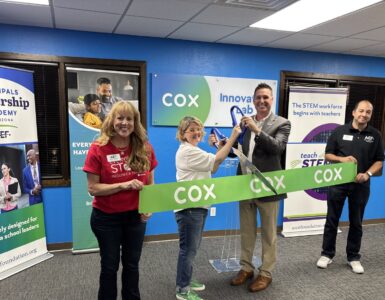For first-year college students, there are a number of new experiences to take in, each one providing its own level of excitement and jitters. From getting the right books to adjusting to a new schedule and a different kind of classroom experience, there are a lot of “firsts” for college freshmen.
But for first-generation college students, who are not only stepping onto a college campus for the first time but are also coming from a home with no college experience, those challenges can seem even more daunting.
To help these students, Valley-based financial institution TruWest Credit Union is teaming up with Mesa Community College (MCC) to provide the right tools and resources to step into post-high school life with a little direction.
Using a two-pronged approach, the joint program will help students get on the right track to keep their educational goals in check as well as teach them the fundamentals of real world finances. TruWest has donated $25,000 to the MCC First Year Experience program, which provides scholarships for financial literacy classes available this fall.
Students at both MCC campuses can take advantage of the program, which currently has about 115 participants. The year-long college program, which at this point only allows students who attended one of six Mesa high schools, is focused on supplying first-year and first-generation college students with the resources and guidance needed to transition into college, then on to a four-year university, and then finally into the workforce.
For Melissa Carpenter, director for the school’s Foundations for Student Success department, a major push behind the program was to find solutions to risk factors that make college more difficult or intimidating for first-generation students.
“We have students with other risk factors, such as not being academically prepared for college. We also find that in general, even with financial aid, most students are trying to work part-time or even full-time. There can be some pressures to contribute to the family they live with. We’re trying to help them juggle their responsibilities, but prioritize going to school full-time,” said Carpenter. “They may not have a role model on how to do college, so it’s about how they navigate through that college knowledge when it doesn’t come from home.”
Carpenter notes that students are set up with a faculty member, a student services contact, and a student ambassador in a multi-pronged approach to set them up for success.
Another way the program helps students stay on course is by helping them select a major. While it’s normal for students to change majors once or twice throughout their college career, getting a grip on the overall direction is crucial in order to avoid lagging too far behind, according to Carpenter.
“It’s normal to change majors, maybe even two or three times. So it’s critical to identify a course of study that matches their values and their goals,” she says. “We give them the tools to be thoughtful about choosing a major. What happens normally is that they change a major in that first year, but there’s a great deal of communication in that time.”
Apart from navigating the first stages of college-hood, learning skills like time management and note-taking skills, college reading strategies, and test preparation, students and their parents will also take advantage of financial literacy trainings. To help students with the complex system that is financial aid and money management during college, MCC provides education on what financial aid is all about.
“It’s not just navigating the financial aid but it’s also about budget and managing money,” said Carpenter. “You’re going to need to provide a lot for financial aid. We work with our financial office to help them understand what they need to establish with their aid. We also teach them about the differences between loans and Pell grants, and what subsidized and unsubsidized means.”
















Add comment